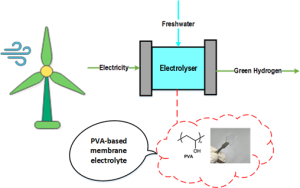

Research projects

- Research area
Develop a resilient net-zero energy system
- Institution
University of Hull
- Research project
Efficient and Sustainable Offshore Wind Turbine-driven Green Hydrogen production
- Lead supervisor
- PhD Student
- Supervisory Team
Prof Masamichi Nishihara, Kyushu University; Prof Stephen Lyth, Kyushu University (Japan)
Project Description:
This Research Project is part of the EPSRC CDT in Offshore Wind Energy Sustainability and Resilience’s Hybrid Offshore Wind Energy Solutions Cluster.
Green hydrogen, produced from renewable sources such as offshore wind energy, plays a vital role in decarbonising hard-to-electrify sectors such as shipping, aviation, and heavy industry. To drive progress in this direction, the UK actively supports wind-to-hydrogen projects such as Dolphyn and Gigastack. Polymer electrolyte water electrolysers (PEWEs) are a preferred choice for these projects due to their high efficiency and responsiveness compared to alkaline electrolysers. PEWEs rely on sulfonated fluoropolymer electrolytes such as Nafion, which are high-performance materials with excellent ionic conductivity. However, these electrolytes pose challenges as they are both prohibitively expensive and contain perfluorosulfonic acids, known as “forever chemicals”, with adverse ecological effects due to their persistence in the environment. Furthermore, the sulfonated fluoropolymer electrolytes exhibit relatively low durability, being more susceptible to chemical degradation caused by free radical attacks. Given these concerns, it becomes imperative to explore more sustainable, cost-effective, and durable polymer electrolyte alternatives.
Hydrocarbon electrolytes are often cost-effective, readily synthesised, and environmentally friendly. Notably, a hydrocarbon-based electrolyte, the polyvinyl alcohol (PVA) membrane, has exhibited enhanced durability compared to Nafion membrane electrolytes (this study has been led and published by Prof Nishihara and Prof Lyth, co-supervisors for this PhD project). However, its ionic conductivity is less than of Nafion membrane electrolyte, and it is susceptible to water solubility. Consequently, there is a need to chemically and mechanically enhance PVA-based membrane electrolytes to boost their ionic conductivity and water stability. This project marks the first time that the focus is on developing considerably more sustainable and cost-effective PVA-based membrane electrolytes. This will ultimately boost the affordability, sustainability and lifetime of the green hydrogen conversion technologies including the PEWEs. This project is supported by IMI VIVO which is a newly established global leader in the manufacturing of hydrogen PEWEs.
Below are the specific objectives of the project:
- Construct a physical model for the hydrogen electrolyser to optimise the properties of the newly developed membrane electrolyte theoretically.
- Employ computational results to guide experiments, thereby expediting design iterations, and conserving time and resources.
- Validate the theoretical models using empirical data generated from experiments.
- Utilise advanced characterisation techniques to gain insights into ionic conduction, gas permeation, and degradation in PVA-based membrane electrolytes.
- Investigate the impact of chemical and mechanical agents on the ionic conduction, gas permeation, and degradation of the proposed electrolytes.
- Test the developed membrane electrolytes in lab-scale hydrogen electrolysers.

The core concept of the PhD project: Employ wind energy to power green hydrogen electrolysers featuring affordable and eco-friendly polyvinyl alcohol (PVA) membrane electrolytes.

